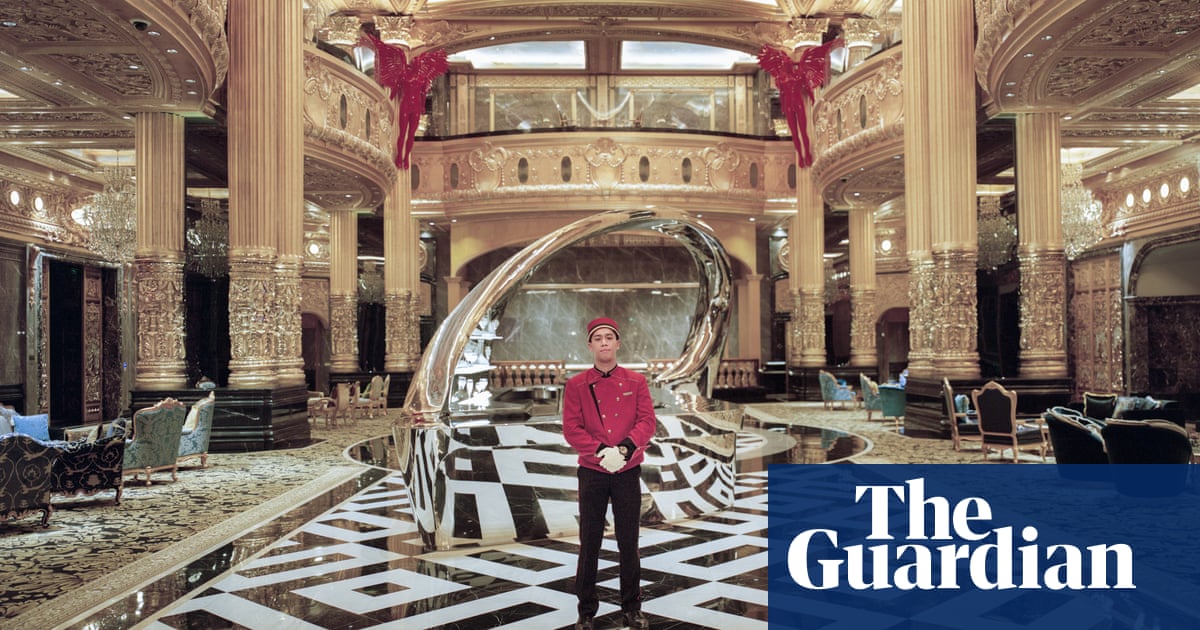What is the one true religion? That is one of several leading questions posed by Hugh Grant’s professorial villain Mr Reed in the hit new film Heretic, which twists examinations of faith into viciously entertaining psychological horror.
Mr Reed’s targets are, at least externally, representatives of religious certainty: two sister missionaries from the the Church of Jesus Christ of Latter-Day Saints who knock on his door with hopes to convert him. Sister Barnes (Yellowjackets’ Sophie Thatcher), a convert from Philadelphia, is quieter, more droll and naturally skeptical. Sister Paxton (Chloe East), raised Mormon in Utah, is more stereotypically chipper, polite and credulous. Both believe Mr Reed – at least enough to step inside and escape a downpour – when he says that his wife is baking pie in the other room and will join them shortly; sister missionaries are not allowed to be alone with a man unless another woman is present.
Initially, Mr Reed seems enthusiastic and curious about their faith; he even has a dog-eared copy of the Book of Mormon. But the conversation rapidly darkens, as Mr Reed devilishly pokes holes in Mormon doctrine and history, as well as most other organized religions, as a means of psychological destabilization, control, fear and eventually violence – Heretic is, after all, a horror film, written and directed by A Quiet Place film-makers Scott Beck and Bryan Woods. The characters’ Mormonism serves as an entryway into a psychological thriller of belief, as poked and prodded by a madman with the demeanor of a demented religious studies scholar (and played against type with relish by a never-better Grant). The film has, unsurprisingly, drawn the ire of the Mormon church, which said in an official statement that it “promotes violence against women because of their faith” and “undermines the contributions of volunteers” that “runs counter to the safety and wellbeing of our communities”. The church-owned Deseret News reviewed the film as “dismissive of what believers find sacred”.
But for those raised in the Mormon church, a modern American religion often subjected to outside fascination via true crime series, influencer-driven reality shows or satirical caricatures, the prospect of two sister missionaries finding themselves trapped in a dangerous situation, and the metaphor of doubt as a terrifying, infernal descent, felt all too real. The portrayal of Mormon missionaries was “one of the best I’ve seen,” said Lexi Seals-Johnson, who grew up in the church and went on to establish Lost & Found Club, a group for the female and genderqueer ex-religious community in Salt Lake City, which hosted its own Heretic screening. “I know many woman who served missions, my wife included, could not even watch the trailer because of how eerily similar the first scenes were.” While some phrasing “may have been a bit off”, said Nicole Merritts of Salt Lake City, “the naivety of their young age, attempts to stay positive, and the mix of optimistic and weary personalities was a fairly accurate characterization.”
For Whitney Rose, a star of The Real Housewives of Salt Lake City – which, along with Secret Lives of Mormon Wives, serves as a primary locus for Utah fascination in pop culture – Heretic “depicted exactly what I know missions to be”. Rose, a member of a founding Mormon family who left the church, hosted a joint screening in Salt Lake with Whitney Leavitt, of the Secret Lives of Mormon Lives, who is still faithful, playing on Mr Reed’s binary of Belief/Disbelief and prompting discussions of integrating doubt into one’s practice of faith. To Rose, Barnes and Paxton’s naivete, politeness and vulnerability felt spot on. “You’re sending 18-year-olds out into the world who have grown up in a bubble and shelter of Mormonism,” she said. “You grow up thinking one way your entire life, and at 18, all of a sudden you’re supposed to go out and figure out how to be safe and invite people into a religion.”
Rose is one of many formerly devout Mormons to react strongly to the movie, from Reddit threads delving into issues of faith and missionary safety to TikToks expressing shock at the accuracy of small details – East’s Utah accent, the way Barnes frames her status as a convert (“such a typical Utah Mormon response,” said Merritts), the way Barnes and Paxton tiptoe around their curiosity of sex in the opening scene, with Barnes framing her own brush with pornography as a lesson from God. “That’s such a missionary thing to do,” said Caroline Brammer, who was raised Mormon and saw the film in Austin, Texas.

In one of his many belabored speeches deconstructing religion, Mr Reed quotes Gordon B Hinckley, who served as president of the church from 1995 until 2008. “When I hear about Mormons in pop culture, they usually take jabs at Joseph Smith or Brigham Young, who were early prophets and easy to criticize,” said Brammer. “But I don’t know if I’ve ever heard someone talk about Gordon B Hinckley, who was the prophet of my childhood.” The quote was so specific – “I don’t even know how you would go looking for that,” she said – that it prompted her to google if the film-makers were Mormon.
Beck and Woods are not; they first developed the idea for the film while working in Salt Lake and befriending many Mormon and ex-Mormon families. For research, they read not only the Book of Mormon but the Quran, various atheist thinkers and Nick Bostrom’s simulation argument, among other texts. They consulted numerous Mormon friends on the script, along with “a consistent gut check of like, are we approaching things with empathy?” said Beck. “Are we actually embodying what our knowledge of Mormon missionaries are actually like? Are we making sure that they don’t feel like caricatures? Are they authentic people? Which is always the goal when you write a script, but it felt like there was a little more responsibility to this.”
Aspects of the dialogue, such as the sister missionaries admitting to each other that some of the songs in the Book of Mormon were funny, were drawn from real conversations. “We’re taking a lot of the truth of what we knew from our friends and putting it in the mouths of these two missionaries, because we feel like the portrayal of the LDS community, and in particular missionaries, are always caricatures,” said Woods. It also helps that both East and Thatcher were raised Mormon, which informed the idiosyncrasies of their performances.
Brammer compared the film favorably to the Hulu series Under the Banner of Heaven, a prestige TV adaptation of a book about murders by violent Mormon fundamentalists, which “sounded very clunky” like “they never actually talked to someone who was Mormon”. Heretic is “more focused on the reality that missionaries are just 19-, 20-year-old kids, and not all of them are as like righteous as you’d imagine. A lot of them are questioning things, and going on missions for different reasons,” she said. And they’re kids – “they talk about stupid stuff like porn or sex”.

And, in some cases, move away from the church; several ex-Mormon viewers noted that the terror of the film’s latter half (no spoilers!) offered a metaphor for the bewildering deconstruction of belief system. “I appreciated that both subtle LDS nuances and a spectrum of beliefs were represented,” said Mae Warner, of Salt Lake City. “In my own life, deconstructing religious beliefs felt violating and not fully consensual. Heretic captures that experience both explicitly and metaphorically in such poignant ways.”
The film was “a fairly provocative portrayal of faith in general”, said Seals-Johnson. “It’s always jarring to hear details of the Mormon church discussed in mainstream media because so much of it is hush-hush.”
For Rose, though aspects of the film “validated my faith of knowing that we’re held accountable for how we treat each other”, the psychological resonated with her departure from the church. “I feel like that was me,” she said. “Obviously on a completely different journey, but the mental turmoil and the torment and the struggle that I went through in my 20s of leaving the church, when I had my faith crisis – that’s what it feels like. It does feel that traumatic.”
Rose, like the others I spoke to, did not expect the truly devout to watch the film, given the church’s public disapproval. “It would be probably considered not the right thing to do,” she said. But she wishes anyone of any faith would see it, “for their own faith, and just for more understanding of why people leave”.
-
Heretic is out in cinemas now

.png) 1 month ago
10
1 month ago
10













































